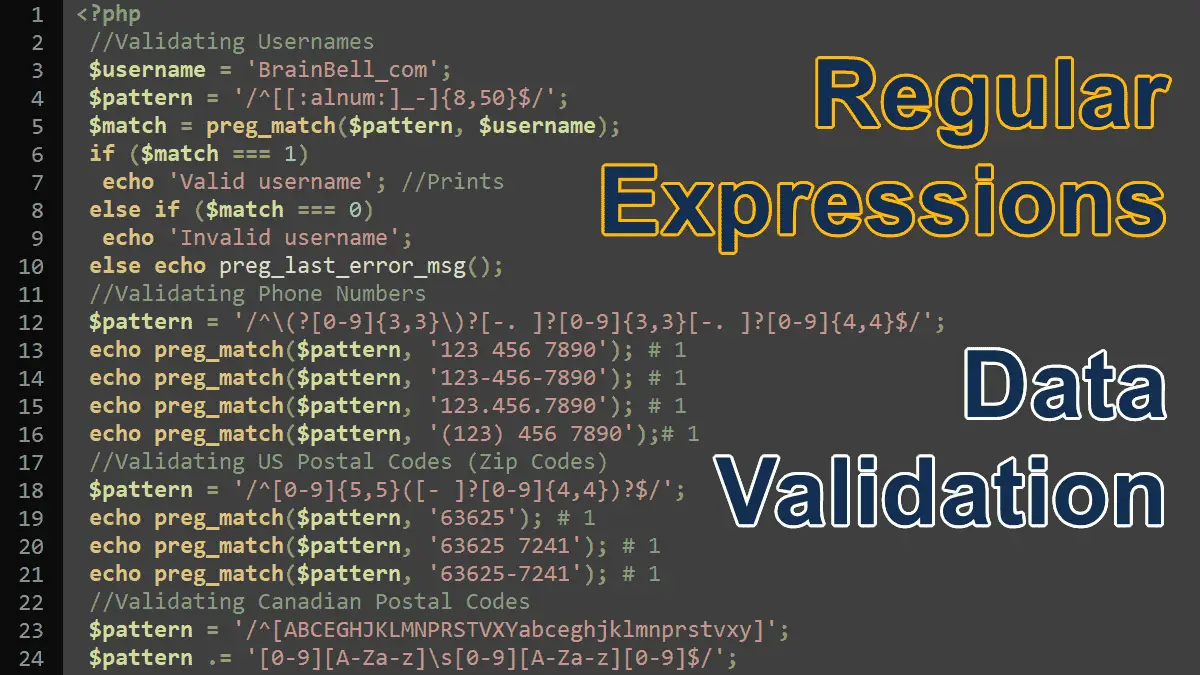Validating Usernames
- Username must consist of alphanumeric characters, dashes, and underscore.
- Username length must be between 8 and 50 characters.
The regular expression for this turns out to be pretty simple: [[:alnum:]_-]{8,50}. We can then use the preg_match() function to actually make sure that a username conforms to this pattern, as follows:
<?php
$username = 'BrainBell_com';
$pattern = '/^[[:alnum:]_-]{8,50}$/';
$match = preg_match($pattern, $username);
if ($match === 1)
echo 'Valid username';
else if ($match === 0)
echo 'Invalid username';
else
echo preg_last_error_msg();
Matching Phone Numbers
A slightly more interesting example would be to match U.S. and Canadian telephone numbers. In their most basic forms, these are a sequence of seven digits, usually separated by some character such as a space, a dash -, or a dot .. A regular expression for this would be as:
[0-9]{3,3}[-. ]?[0-9]{4,4}.
This simple expression says match exactly three digits ([0-9]{3,3}), followed optionally by a single dash, period, or space ([-. ]?), and then match exactly four more digits ([0-9]{4,4}).
The area code, which is a three-digit number, can optionally be wrapped in parentheses, or not wrapped in parentheses but separated from the other digits by a space, dash, or dot. Our regular expression begins to get more complicated. The new portion of the expression to match the area code will look like this:
\(?[0-9]{3,3}\)?[-. ]?
Because the ( and ) characters are meta-characters used by regular expressions, we have to escape them with the backslash \ to use them as characters we want to match. Our complete regular expression thus far would be this:
\(?[0-9]{3,3}\)?[-. ]?[0-9]{3,3}[-. ]?[0-9]{4,4}
Example: Validating phone numbers
<?php
$pattern = '/^\(?[0-9]{3,3}\)?[-. ]?[0-9]{3,3}[-. ]?[0-9]{4,4}$/';
echo preg_match($pattern, '123 456 7890'); # 1
echo preg_match($pattern, '123-456-7890'); # 1
echo preg_match($pattern, '123.456.7890'); # 1
echo preg_match($pattern, '(123) 456 7890');# 1
Matching Postal Codes
<?php
$pattern = '/[0-9]{5,5}([- ]?[0-9]{4,4})?/';
U.S. postal codes (Zip codes) are a sequence of five digits followed optionally by the “plus 4,” which is a dash character followed by four more digits. A regular expression for this is as follows:
<?php
$pattern = '/^[0-9]{5,5}([- ]?[0-9]{4,4})?$/';
echo preg_match($pattern, '63625'); # 1
echo preg_match($pattern, '63625 7241'); # 1
echo preg_match($pattern, '63625-7241'); # 1
Validating Canadian Postal Codes
Canadian postal codes are always of the format X#X #X#, where # represents a digit and X a letter from the English alphabet. A regular expression for this would be as follows:
[A-Za-z][0-9][A-Za-z] [0-9][A-Za-z][0-9]
Example: Validating Canadian Postal Codes:
<?php $pattern = '/^[A-Za-z][0-9][A-Za-z]\s[0-9][A-Za-z][0-9]$/'; echo preg_match($pattern, 'A0A 0A0'); # 1
Note: A Canadian postal code always starts with the letters: ABCEGHJKLMNPRSTVXY. We could rewrite our regular expression as follows:
<?php $pattern = '/^[ABCEGHJKLMNPRSTVXYabceghjklmnprstvxy]'; $pattern .= '[0-9][A-Za-z]\s[0-9][A-Za-z][0-9]$/'; echo preg_match($pattern, 'A0A 0A0'); # 1
More Regular Expressions Tutorials:
- Regular Expressions
- Matching patterns using preg_match() and preg_match_all()
- Splitting long paragraphs using preg_match_all() function
- Cleanup Text by Removing Extra Spaces (Except Newlines)
- Search and replace with preg_replace() and preg_filter()
- Search and replace with preg_replace_callback() and preg_replace_callback_array()
